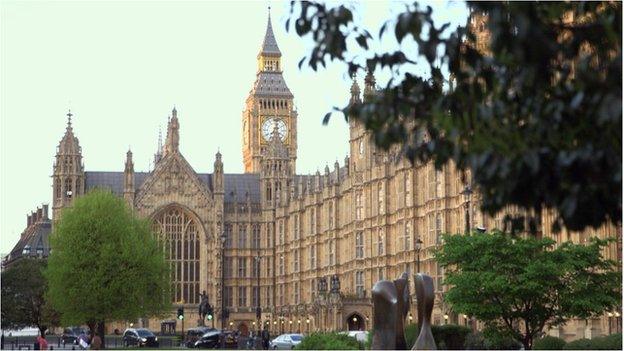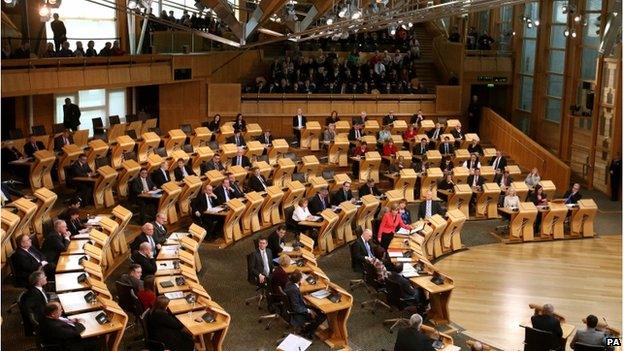Calls made in Commons to strengthen Scotland Bill
- Published

There have been calls for additional welfare powers for Holyrood to be included in the Scotland Bill being debated in the Commons.
Tuesday is the third day of debate on the legislation.
It will give further control to the Scottish parliament over taxation, VAT revenues and welfare.
Scottish secretary David Mundell has been accused of failing to listen and respond to calls for changes to the Scotland Bill, external.
The claim was made in the Commons as the legislation on additional powers for Holyrood was scrutinised.
Mr Mundell said the government would not back any amendments that were "bad for Scotland".
MPs voted against the SNP's proposals for an agreement between the two governments which would pave the way for full fiscal autonomy, by 504 to 58.
They also voted against Labour's proposals for an independent commission to assess the impact of the SNP's plan for full fiscal autonomy.
Mr Mundell said he did not need a commission to know that full fiscal autonomy would be a disaster for Scotland's finances.
The government won that vote by 376 votes to 192.
The SNP has tabled amendments, external that would give Holyrood greater powers over welfare and employment law than those which have been proposed.
During the second day of committee stage debate on the bill, former Scottish Secretary Alistair Carmichael said the government had not responded properly to consultation since draft clauses on further powers were published by the previous coalition government.
'Significant milestone'
The Liberal Democrat said Mr Mundell "has the ability through the good office that he holds to bring all the parties together again, to consider those representations that have come up in the course of the consultation and to consider whether in fact the complexities and the possible areas of conflict that could arise by implementing the tax power in the way that is currently considered are actually worth it."
The SNP's Tommy Sheppard said there was frustration that Mr Mundell appeared to be resisting any amendment which was contrary to his point of view.
The Scottish secretary responded by saying he had considered various issues and would continue to do so.

He said the changes proposed by the UK government would give "unprecedented flexibilities" to the Scottish Parliament on income tax and were a "significant milestone in Scotland's devolution journey within the UK".
Labour has also tabled several amendments on taxation and welfare powers.
The bill, which was based on the recommendations of the cross-party Smith Commission, will give Holyrood control over income tax rates and bands, a half share in VAT revenues and a greater say over some welfare benefits.
Apart from discussion over SNP calls for full taxation and spending powers to be handed over, Labour's proposal for an independent commission into the impact of full fiscal autonomy - which analysts suggest would leave a £10 bn deficit in Scotland's finances - was also debated.
Remove any veto
Among the SNP amendments is a proposal which would see the Scottish and UK governments enter into an "Economic Agreement" which would set out a plan for implementation of full fiscal autonomy.
It would also establish a framework within which the two governments would "coordinate their economic and fiscal policies in the context of full fiscal autonomy".
Further amendments would remove any veto Westminster may have over new welfare powers that are being devolved to Scotland.
The party also wants Holyrood to be given control over working age benefits, benefits relating to children, and employment support programmes.
And it wants control over National Insurance contributions, employment law and equal opportunities being given to MSPs.
A previous amendment that would have given Holyrood the ability to move towards full fiscal autonomy at a time of its choosing was voted down last week.
SNP Westminster leader Angus Robertson earlier urged MPs from other opposition parties to back the amendments, which he said would show whether Labour supported Scottish control or continued Westminster control in these key areas.
Mr Mundell said the Scotland Bill would already give the Scottish Parliament "substantial" tax and VAT powers worth about £15bn.
Labour's proposals include giving a final say on benefits rates for the Scottish Parliament, unrestricted power to create new devolved benefits, a power to top up benefits, including in reserved areas, and the full devolution of housing benefit.
In the area of taxation, amendments include establishing an independent expert commission to assess the impact of full fiscal autonomy, and the creation of a Scottish Office for Budget Responsibility.
Labour also hopes to give Holyrood the power to achieve an equal gender balance in the Scottish Parliament and on the boards of public bodies.